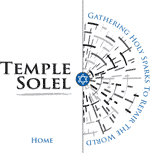So... It's that time of year. Our college students are hunkering down for their final exams. Some of them have already left campus for the semester (or graduated! Mazel Tov!). Everyone is looking forward to the quickly-approaching summer.
Which means: that this will be our last official Etanu posting of the school year. I'll post again as needed during the summer, if current events demand it. But for the meantime...my virtual self will be taking a little break.
If you find yourself in Encinitas in person, give me a ring, as I'd love to have coffee or catch up with any of our students. Many of you are travelling this summer...to sightsee, to volunteer, or to study -- in Israel and beyond. I'd love to see pics and hear how all of those experiences go for you. Please do keep us posted.
This week's Torah portion is Parshat Naso, and continues the Torah's ongoing narrative about concerns related to ritual purity and other such seemingly-bizarre issues that our Biblical ancestors gave a good deal of thought to.
But buried in all of this is a beautiful little gem of a teaching.
One of the things that the parsha explains is the institution of the Nazirite. Nazirites were people (men and women!) in Biblical times that could make a vow (or sacred promise) to take on extra religious obligations for a certain period of time. Kind of like getting extra credit in religious school -- but the extreme version of that.
Anyway, the section about Nazirites is introduced in the following way:
"Speak to the Israelites and say to them: If anyone, man or woman, explicitly utters a nazirite's vow, to set himself apart (yafli) for the Lord..." Numbers 6:2
Now our rabbis always approach Torah with the belief that every word is in there for a reason. And so: you can imagine the head scratching that ensued in every generation, when they came upon the Hebrew verb that is used here in the text to express a sense of separation: yafli. (This is not the typical Hebrew word that would be used to indicate separation. So, why this verb?)
Yafli shares its Hebrew root pey-lamed-alef with the word niflah, which means "miracle" (in the same linguistic family as "pelephone," the Hebrew word for cell phone: literally a miracle-phone!!!).
Ibn Ezra, of 12th century Spain, offers the following as explanation for the Torah's strange choice of wording: "[A nazirite's] action is a miracle, because most people in the world act in accordance with their desires and lusts, and this person [the nazirite] acted in exactly the opposite way, forbidding to himself that which the Torah permitted."
Another commentary goes further, relating the story of a man who once asked a rabbi: "Why is it that righteous people are often referred to as osei nifla'ot - miracle workers? Are they really able to perform miracles?!?" The rabbi answered him: "According to Ibn Ezra, every person who keeps himself holy and abstains from the vanities of this world is referred to as a pele - as a miracle. As that is the way that righteous people behave, they were given this name, signifying their abstention from the vanities and lusts of this world."
What an amazing set of insights. Ibn Ezra, living more than eight hundred years ago, already had an understanding of human nature: that we are unfortunately inclined/seduced into making mistakes. And so it is truly miraculous when we are able to transcend that part of ourselves (often called our yetzer ha-ra) and still choose to do good, and be righteous in the world.
Okay...so we don't have any notion of Nazirites in our Jewish world today.
Yet, like our Biblical ancestors, we do have a choice about the way that we live our lives: we can choose to be just like everybody else...and make the same mistakes, and have the same human failings as everybody else. Or we can choose to live lives of holiness: lives in which we consciously and voluntarily go out of our way to make choices of righteousness...choices that are truly miraculous, if you think about all of the temptations that are out there, and that we confront, every day.
My hope for you, and for all of us, is that as we head into this summer, we remember the example of the Nazirite...and in doing so, remember that we, too, can do miracles, by living lives of holiness, and of good.
Shabbat Shalom.
PS - Although it is kind of "goody two-shoes," you may want to check out this website, which is filled with stories of people doing amazing, miraculous things.
Subscribe to:
Post Comments (Atom)





Sorry to have just gotten to this post.
ReplyDeleteExcellent.
Thanks.
Will share with others.